新二语法精讲及测试练习3--一般过去时
(完整版)新概念英语时态讲解及练习题(五种时态)

五种时态讲解及练习题英语的时态(tense)是一种动词形式,不同的时态用以表示不同的时间与方式。
下面就英语中常见的八种基本时态进行阐述,其它的时态都是在这八种时态的基础上结合而成的。
一、一般现在时:1.概念:经常、反复发生的动作或行为及现在的某种状况。
2.时间状语:always, usually, often, sometimes, every week (day, year, month...), once a we ek, on Sundays,3.基本结构:动词原形(如主语为第三人称单数,动词上要加(e)S)4.否定形式:am/is/are+not;此时态的谓语动词若为行为动词,则在其前加don't,如主语为第三人称单数,则用doesn't,通常还原行为动词。
5.一般疑问句:把be动词放于句首;用助动词do提问,如主语为第三人称单数,则用doe s,同时,还原行为动词。
6.例句:It seldom snows here.He is always ready to help others.Action speaks louder than words.1.I like ____________ (swim).2.He _________(read) English every day.3.We _________(go)to school at seven in the morning.4.Mike________(go)to school at seven in the morning.5.My mother________(like) ______(go) shopping.6.I can ________(draw) many beautiful pictures.7.She_________(make) a model plane.8.Do you ________(like)_________(run)?9.Does he_________(like)_________(jump) ?10.Does Nancy_________(grow)flowers on Saturday ?11.The teachers________(like)___________(dance).12.The teacher________(like)____________(dance).2)用所给的人称改写句子1.I take photos on Sunday. ( Mike)2.We grow beautiful flowers. (she)3.They like collecting stamps. (Ben)4.I listen to music carefully. (my aunt)5.You like making a model ship. (Helen二、一般过去时:1.概念:过去某个时间里发生的动作或状态;过去习惯性、经常性的动作、行为。
精讲新概念英语第二册(第3课)
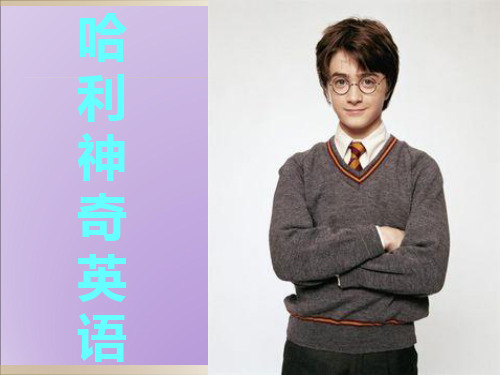
A friendly waiter taught me a few words of Italian.
A few / a little A friendly waiter taught me a little Italian. 可数名词
本课重点学习词汇总结
Send Spoil / destroy / ruin Museum Lend / borrow A few / a little
哈 利 神 奇 英 语
/
新概念第二册 全能中考衔接班
新概念 第二册
PRACTICE & PROGRESS 实践与进步
Lesson 3
Please send me a card 请给我寄一张明信片
STEP 0NE 口语听力训练
LISTEN TO THE RECORDING AND ANSWER MY QUESTIONS IN ORDER TO PRACTICE YOUR LISTENING AND SPEAKING ABILITIS
18世纪许多启蒙运动人士试图重立对缪斯的崇 拜。英语中博物馆(Museum,本来的意思是 “缪斯的崇拜地”)就是从这个运动产生的, 它的意思是说,博物馆是一个向公众展示知识 的地方。
Music 音乐
lend vt.把…借给
Can you lend me five dollars? 你能借给我五美元吗?
教材例句 (外研7A-8)
We usually send him a birthday card.
2. 派遣
Peter’s boss has sent him to New York.
3. 派人请
小学英语语法一般过去时总结及练习
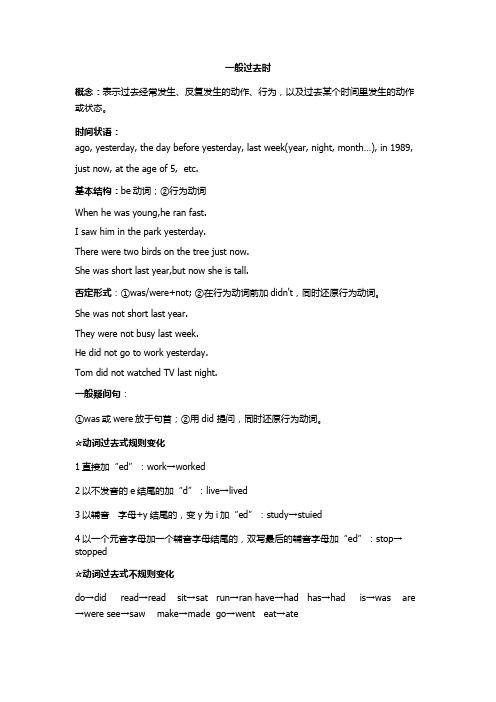
一般过去时概念:表示过去经常发生、反复发生的动作、行为,以及过去某个时间里发生的动作或状态。
时间状语:ago, yesterday, the day before yesterday, last week(year, night, month…), in 1989, just now, at the age of 5, etc.基本结构:be动词;②行为动词When he was young,he ran fast.I saw him in the park yesterday.There were two birds on the tree just now.She was short last year,but now she is tall.否定形式:①was/were+not; ②在行为动词前加didn't,同时还原行为动词。
She was not short last year.They were not busy last week.He did not go to work yesterday.Tom did not watched TV last night.一般疑问句:①was或were放于句首;②用did 提问,同时还原行为动词。
☆动词过去式规则变化1直接加“ed”:work→worked2以不发音的e结尾的加“d”:live→lived3以辅音字母+y结尾的,变y为i加“ed”:study→stuied4以一个元音字母加一个辅音字母结尾的,双写最后的辅音字母加“ed”:stop→stopped☆动词过去式不规则变化do→did read→read sit→sat run→ran have→had has→had is→was are →were see→saw make→made go→went eat→ate一般过去时的练习一、用所给的动词的适当形式填空。
⒈He ___________(visit) the Great Wall last year.2.We____________(have) a good time yesterday.3.We often __________(go) to school by bus last year.4.I __________(live)in the village when I was a child.5.Mike__________(see) a big tiger in the nature park last year.6.Sam___________ (do) the housework yesterday.7.________(do) you _________(enjoy) yourself yesterday?8.________(do)you __________(play) the violin in the artroom yesterday?9.I __________ (eat) a big pizza yesterday.10.There_________ (be) many sheep on the farm last year.11. I _________ (watch) a cartoon on Saturday.12. Her father __________ (read) a newspaper last night.13. We _________ to zoo yesterday, we ___________ to the park. (go)14. _________ you __________ (visit) your relatives last Spring Festival?15. _________ he __________ (fly) a kite on Sunday? Yes, he __________.二、单项选择( ) 1. She watered the flowers ________.A tomorrowB sometimesC yesterday morning( ) 2.What ____ Mike do last weekend ?A doB doesC did( ) 3. I ___ my room last Sunday.A cleanedB cleanC am cleaning( ) 4. _____ you _____ TV last night .A Do, watchB Did, watchC Did, watched( ) 5.---Did your father write an e-mail yesterday ?A Yes, he did.B Yes, he doesC No, he don’t( ) 6.They _____ on a trip in February ,2007.A are goingB goingC went( ) 7. ____ he ____ football two days ago?A Does , playB Did , playedC Did , play三、Be动词的过去时练习(一)用be动词的适当形式填空。
语法精讲|一般过去时和现在完成时的用法区别
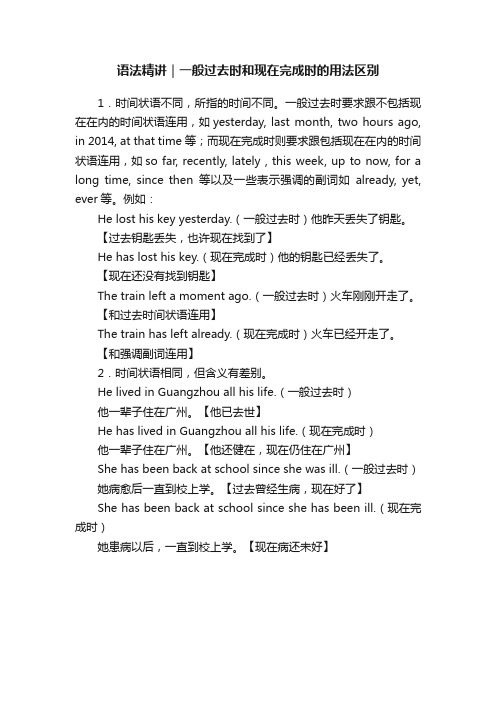
语法精讲|一般过去时和现在完成时的用法区别1.时间状语不同,所指的时间不同。
一般过去时要求跟不包括现在在内的时间状语连用,如yesterday, last month, two hours ago, in 2014, at that time等;而现在完成时则要求跟包括现在在内的时间状语连用,如so far, recently, lately , this week, up to now, for a long time, since then等以及一些表示强调的副词如already, yet, ever等。
例如:He lost his key yesterday.(一般过去时)他昨天丢失了钥匙。
【过去钥匙丢失,也许现在找到了】He has lost his key.(现在完成时)他的钥匙已经丢失了。
【现在还没有找到钥匙】The train left a moment ago.(一般过去时)火车刚刚开走了。
【和过去时间状语连用】The train has left already.(现在完成时)火车已经开走了。
【和强调副词连用】2.时间状语相同,但含义有差别。
He lived in Guangzhou all his life.(一般过去时)他一辈子住在广州。
【他已去世】He has lived in Guangzhou all his life.(现在完成时)他一辈子住在广州。
【他还健在,现在仍住在广州】She has been back at school since she was ill.(一般过去时)她病愈后一直到校上学。
【过去曾经生病,现在好了】She has been back at school since she has been ill.(现在完成时)她患病以后,一直到校上学。
【现在病还未好】。
一般过去时练习及答案

一般过去时练习及答案一般过去时专项练习一、一般过去时表示过去某一时候发生的动作或存在的状态。
常与一般过去时连用的时间状语有:yesterday; the day before yesterday; ---ago; last---; in 1990,etc.二、(一)be动词的一般过去时:肯定句:主语+be动词的一般过去时(was/were)否定句:主语+be动词的一般过去时(was/were)+not一般疑问句:be动词的一般过去时(was/were)+主语(二)there be 结构的一般过去时与动词的一般过去时的变化基本一致。
(三)一般动词的过去时:肯定句:主语+动词的过去时否定句:主语+did not+动词原形一般疑问句:Did+主语+动词原形A:用动词的适当形式填空:1.He __________(work) in that bank four years ago.2.She __________(live) in USA for a long time.3.I __________(see) him yesterday.4.He __________(come) to school at 6 o’clock this morning.5.The boy __________(have) a bad cold yesterday.6.When __________ you __________(buy) that house?7.He __________(tell) a story to his daughter yesterday.8.__________ you __________(try) to call me last night?9.What __________you __________(buy) in the shop?I __________(buy) a coat just now.10.The doctor __________(get) up late this morning.11.She __________(paint) the wall last month.12.My mother __________(be) a worker 20 years ago.13. __________(be) you here just now?No, I __________(be not) here.14.Why __________ your brother __________(cry) last night?15.Yesterday __________(be) my mother’s birthday.翻译下列句子:1.我上周去看爷爷和奶奶了。
语法精讲-现在完成时与一般过去时的区别
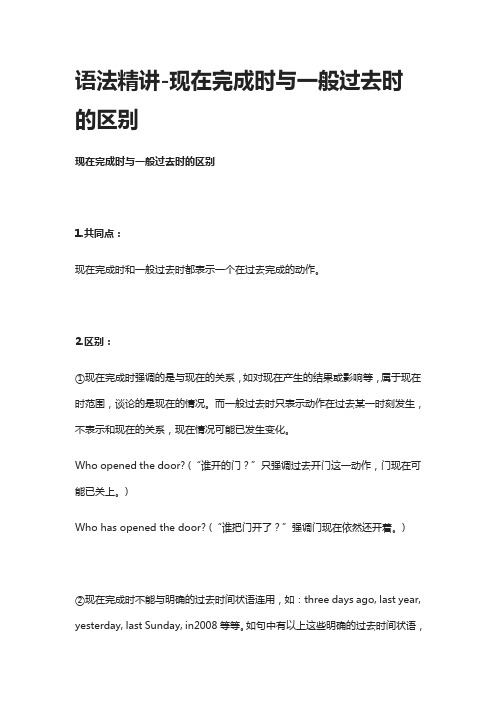
语法精讲-现在完成时与一般过去时的区别现在完成时与一般过去时的区别1.共同点:现在完成时和一般过去时都表示一个在过去完成的动作。
2.区别:①现在完成时强调的是与现在的关系,如对现在产生的结果或影响等,属于现在时范围,谈论的是现在的情况。
而一般过去时只表示动作在过去某一时刻发生,不表示和现在的关系,现在情况可能已发生变化。
Who opened the door? (“谁开的门?”只强调过去开门这一动作,门现在可能已关上。
)Who has opened the door? (“谁把门开了?”强调门现在依然还开着。
)②现在完成时不能与明确的过去时间状语连用,如:three days ago, last year, yesterday, last Sunday, in2008等等。
如句中有以上这些明确的过去时间状语,应用一般过去时。
再有,过去发生的一个动作,如现在情况已经发生的变化,也应用一般过去时。
☆特别提醒:如果这些过去时间状语前有since,表示“自过去某一时间一直延续到现在”,应用现在完成时。
He finished reading the book the day before yesterday.I put my ruler in my pencil-box, but I can’t find it now.My cousin has been in Nanjing since 2009.③现在完成时不与when引导的特殊疑问句连用,when后只用一般过去时表示已发生的动作。
但现在完成时可与where, why等疑问词连用。
如:Where have you been? (你去过哪里了?)--The train has left.--When did the train leave?④since引导的时间状语从句后面用一般过去时,只有前面的主句才用现在完成时。
We have known each other since we came to the school two years ago.⑤有些时间状语,如this morning, this month, tonight等,既可以与一般过去时连用,又可以与现在完成时连用,但内涵不同。
一般过去时讲解及习题(精编版)
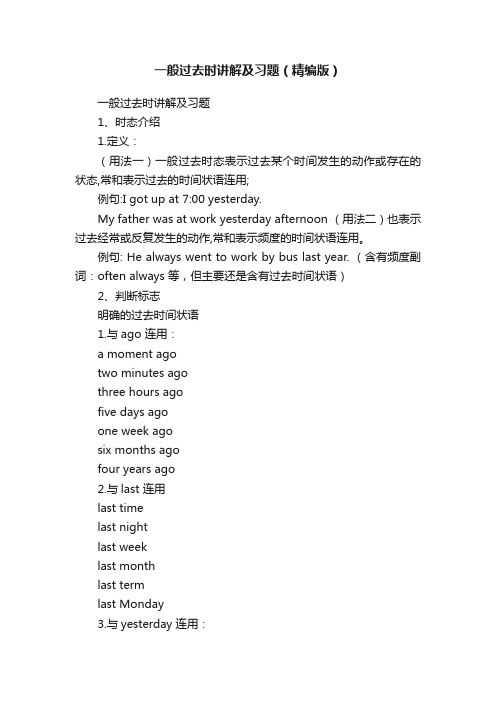
一般过去时讲解及习题(精编版)一般过去时讲解及习题1、时态介绍1.定义:(用法一)一般过去时态表示过去某个时间发生的动作或存在的状态,常和表示过去的时间状语连用;例句:I got up at 7:00 yesterday.My father was at work yesterday afternoon (用法二)也表示过去经常或反复发生的动作,常和表示频度的时间状语连用。
例句: He always went to work by bus last year. (含有频度副词:often always 等,但主要还是含有过去时间状语)2、判断标志明确的过去时间状语1.与ago 连用:a moment agotwo minutes agothree hours agofive days agoone week agosix months agofour years ago2.与last 连用last timelast nightlast weeklast monthlast termlast Monday3.与yesterday 连用:yesterday morningyesterday afternoonyesterday evening the day before yesterday 4.与one 连用:one morningone eveningone dayone Monday afternoon5.与that 连用:that morningthat winterthat daythat year6.其他时间状语:just now 刚刚不久in the old days昔时,从前,过去in those days当时,那时候;当年in 1980the other day前几天at that time在那时;当时once upon a time在很久很久以前3、一般过去时构成be动词(was,were)助动词(did)主语+谓语情态动词(could,might)实义动词(有确切含义的动词,可以单独做谓语,如:played等)例如:They were happy.He played football.You did your homework.4、一般过去时句式变换1.肯定句:主语+ 动词过去式be动词过去式(was / were)e.g. We played football yesterday.I was in the office last night.He couldn’t swim 10 years ago.2.否定句:主语+ did not / didn’t + 动词原形was not / wasn’t + 其他成分we re not / weren’t + 其他成分e.g. I was not in the office last night.I didn't sing a song at Kangkang's party.I didn't play video games.3. 一般疑问句Did + 主语+动词原形?Was / were + 主语+其他成分?eg. - Did you go shopping yesterday?-Yes, I did. / No, I didn’t.-Was she 15 years old last year?4. 特殊疑问句特殊疑问词+did + 主语+行为动词原形?特殊疑问词+was / were + 主语+其他成分?eg. - Did you go shopping yesterday? When and where were you born?5、谓语变化构成规则规则动词过去式的构成1.一般在动词原形末尾加-edlook lookedplay playedstart started2.结尾是e 的动词加-dlive livedhope hopeduse used3. 末尾只有一个辅音字母的重读闭音节词(辅元辅),先双写这个辅音字母,再加-edstop stoppedplan plannedtrip tripped4. 结尾是“辅音字母+y”的动词,先变“y”为“i”再加-ed study studiedcarry carried规则动词-ed的读音说明:1、清念/t/ ,即ed 在清辅音后面念/t/ ,例:finished helpedpassed cooked2、元浊/d/ ,即ed 在元音,浊辅音后面念/d/例:borrowed enjoyedcalled moved3、/t/ /d/ 之后念/id/ , 即ed 在/t/ /d/ 音后面念/id/例:wanted shoutedneeded counted不规则动词的过去式am, is -- wasare -- weredo -- didgo -- wenthave -- hadsee -- sawcan -- couldmay -- mightdig -- dugeat -- atefind -- foundmake -- madehear -- heardrun -- ran take -- took hold -- heldspeak -- spoke leave -- leftkeep -- keptsleep -- slept sweep -- swepttell -- toldsell -- soldbegin -- begansing -- sangsit -- satswim -- swamring -- ranggive -- gavebring -- broughtbuy -- boughtthink -- thought teach -- taught catch -- caught come -- came become -- becamegrow -- grewknow -- knewthrow -- threwblow -- blewwrite -- wrotedrive -- droveride -- rodeget -- gotforget -- forgotlend -- lentsend -- sentspend -- spentsay -- said */sed/pay -- paidstand -- stoodunderstand -- understoodlet -- let put -- putcut -- cut read -- read*巧记动词一般过去时,表示过去发生事;be用was或用were, have,has变had;谓语动词过去式,过去时间坐标志;一般动词加-ed,若是特殊得硬记。
(完整版)中考时态专题一般过去时详细讲解及练习
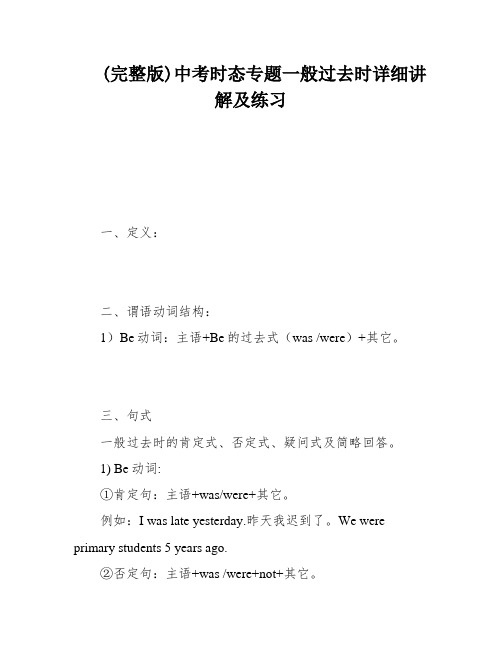
(完整版)中考时态专题一般过去时详细讲解及练习一、定义:二、谓语动词结构:1)Be动词:主语+Be的过去式(was /were)+其它。
三、句式一般过去时的肯定式、否定式、疑问式及简略回答。
1) Be动词:①肯定句:主语+was/were+其它。
例如:I was late yesterday.昨天我迟到了。
We were primary students 5 years ago.②否定句:主语+was /were+not+其它。
例如:___(我们昨天没迟到)③一般疑问句:be动词提前。
Was/Were+主语+其它?例如:I was ___(改一般疑问句) →Were you ill yesterday?(你昨天病了吗?)肯定回答:Yes, I was. (是的,我病了。
)否定回答:No, I wasn't. (不,我没病。
)④特殊疑问句:对谓语动词进行提问的:疑问词+was/were+主语+其它(一般疑问句)?2) 实义动词:①肯定句:主语+V-ed+其它。
例如:I called up my good friend just now.②否定句:主语+didn’t+V原形+其它。
例如:I didn’t argue with Tom last week.③一般疑问句:Did+主语+V原形+其它?例如:___ 2010. (改一般疑问句) →Did you buy a souvenir in 2010?肯定回答:Yes, I did.否定回答:No, I didn’t.④特殊疑问句:疑问词+did+主语+V原形+其它?例如:When did you buy the book?(你是什么时候买的这本书?)Finally, let's fill in the blanks with the correct form of the verb. "Was" should be used for the first blank, "played" for the second, "went" for the third, and "read" for the fourth.5. Tom was upset because he had failed the English test again.6. We moved to Beijing 8 years ago.1. C2. C3. B4. A5. C6. A7. B8. ATom was ___ down because he had failed his English test once again. It had e a recurring problem for him. Eight years ago,my family and I relocated to Beijing. This morning, I asked my friend what time she had arrived at school.1. What did they have for breakfast last week?2. ___?3. Jim ___ she was ___.4. They were not late the day before yesterday.5. Where did you go?6. Did Wei Fang have a good time last summer n? Yes, she did. / No, she didn't.7. Li Hong did not do her ___.8. How did Mr Gao go to work last year?9. Is there tea in the cup?1. Did Wei Fang have a good time last summer n? Yes, she did. / No, she didn't.2. Li Hong did not do her ___.3. How did Mr Gao go to work last year?4. Is there tea in the cup?。
- 1、下载文档前请自行甄别文档内容的完整性,平台不提供额外的编辑、内容补充、找答案等附加服务。
- 2、"仅部分预览"的文档,不可在线预览部分如存在完整性等问题,可反馈申请退款(可完整预览的文档不适用该条件!)。
- 3、如文档侵犯您的权益,请联系客服反馈,我们会尽快为您处理(人工客服工作时间:9:00-18:30)。
新概念英语第二册语法精讲及测试练习三
1.表示过去某个特定时间或某一段时间发生的动作或情况。
. We visited the school last spring.
. I went to school by bike when I was in middle school.
. China was founded in 1949.
2.在表示时间或条件等的状语从句中代替过去将来时。
. She told me that she would not go with us if it rained the next day.
. They would not leave until she came back.
. My friend promised to marry me once she made her final decision.
3.过去时,现在时和过去时的几组差异:(别以为这很简单,下面的差异你不一定明白。
)
● Her brother was a chemist.(已去世)
● Her brother is a chemist.(尚健在)
● That's all I had to say.(话已说完)
● That's all I have to say.(言之未尽)
● It was so nice to see you.(离别时用)
● It is so nice to see you.(见面时用)
● Jane did a lot of work this morning.(已是当天下午或晚上)
● Jane has done a lot of work this morning.(仍是上午)[本句现在完成时,此乃后话!]测试精编I:(用所给动词的正确进态填空)。
1. Yesterday I ________ (think) that you were not in Beijing.
2. Alice usually ________ (sit) in the front of the classroom, but she ________ (sit) at the back this morning.
3. He ________ (tell) the news to us three days ago.
4. He________ (begin) to teach Chinese in 1990.
5. she would not telephone me if she ________ (have) no time.
测试精编II:
1. They ________ the trip until the rain stopped.
A. continued
B. didn't continue
C. hadn't continued
D. would continue
2. The local peasants gave the soldiers clothes and food without which they ________ of hunger and cold.(without 在这里表条件,你知道吗?)
A. would die
B. will die
C. would be dead
D. would have died
3. It was not until then that I came to know that the earth ________ around the sun.
A. moved
B. has moved
C. will move
D. moves
4. When all those present(到场者)________ he began his lecture.(重点题)
A. sit
B. set
C. seated
D. were seated
5. If I had had time, I would have written to you. But in fact I ________ not.
A. have
B. would have
C. had
D. had had
1. thought
2. sits, sat
3. told
4. began
5. had
II 1.B 2.D 3.D 4.D 5.C。
